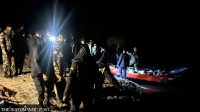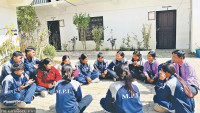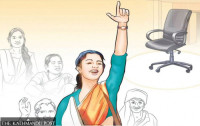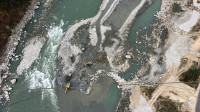National
Lavrov pledges to act on Nepalis’ pleas over kin in Russian Army
Foreign Minister Shrestha asks his Russian counterpart for swift return of dead Nepalis, compensation for families.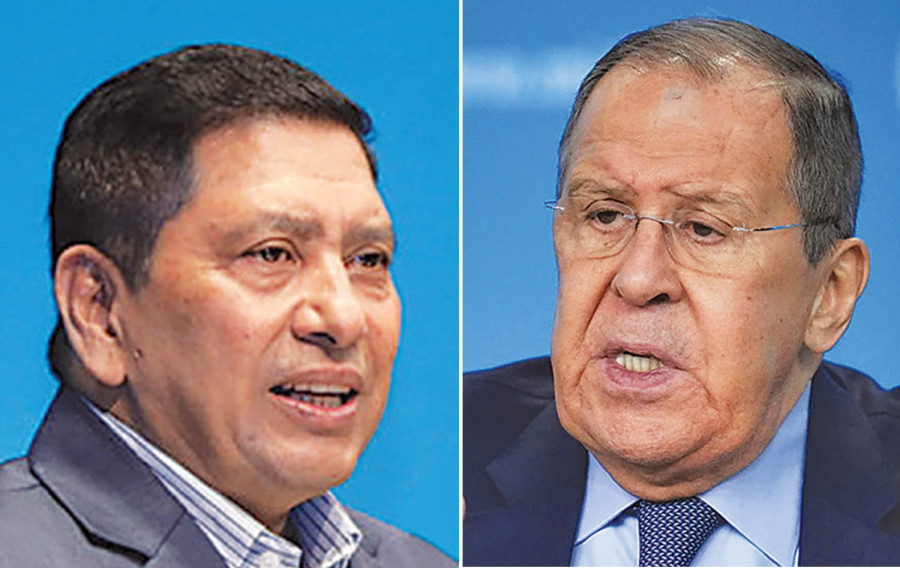
Anil Giri
Weeks after the deaths of over a dozen Nepali nationals serving in the Russian Army, the foreign ministers of Nepal and Russia held a telephone conversation on Thursday.
During the phone call, Deputy Prime Minister and Minister for Foreign Affairs Narayan Kaji Shrestha and his Russian counterpart Sergey Lavrov discussed the issue of Nepali citizens serving in the Russian Army. The two foreign ministers discussed various aspects of Nepal-Russia relations, including the welfare of Nepali citizens in the Russian Army, according to the Ministry of Foreign Affairs.
Kirtu Bhandari, who is leading a campaign on behalf of the families of the Nepali nationals serving in the Russian Army, told the Post that they have information about the deaths of 20 Nepali nationals while fighting alongside the Russian Army in Ukraine.
Bhandari said family members of 20 Nepali nationals killed in the Russia-Ukraine war also conducted their funeral rites after receiving confirmation from the Russian side. “We have reports of the deaths of 20 more Nepalis, but the families are waiting for official confirmation from the Russian side.”
“In most cases, the Russian military informed the families in the event of a Nepali citizen’s death. But the Ministry of Foreign Affairs has information only about the death of 12 Nepali nationals.”
Several families, whose members are currently serving in the Russian Army and fighting Ukrainian forces, have launched a campaign asking for more such family members to join them in order to bolster efforts to find out the actual number of Nepalis serving in the Russian Army, as well as the number of their fatalities and injuries. They also aim to press for better compensation for those killed and injured.
“As per our information, as many as 116 Nepalis are injured, 274 have gone missing, and over 620 have joined the Russian Army,” she said.
The actual number of Nepalis serving in the Russian Army could be higher, said Bhandari.
Deputy Prime Minister Shrestha requested Lavrov to expedite the repatriation of dead Nepalis, provide compensation to the families of the deceased and facilitate the return of Nepali citizens serving in the Russian Army, according to the foreign ministry.
Russian authorities have agreed to provide compensation to the victims’ families. There is also an understanding that such compensation will be sent through the Nepali Embassy in Moscow to the victims’ families through the local governments concerned.
“The Russian side has already sent different proposals of compensation, including amounts to be distributed to the families of those killed and injured,” said a senior foreign ministry official. “Compensation for seven deceased will be released soon.”
However, Russian authorities have not addressed concerns about stopping the recruitment of Nepali nationals as well as the repatriation of the dead, according to foreign ministry officials.
They also said multiple Russian agencies are involved in recruitment, distributing compensation, and repatriation of bodies and this may cause delays in addressing all the demands at once.
The Nepal government has already alerted its nationals against joining the Russian Army.
“We have already informed the Russian government that recruitment of Nepali nationals into its army is illegal. The government has made it mandatory for Nepalis to obtain a ‘no objection letter’ before travelling to Russia,” said Prime Minister Pushpa Kamal Dahal while addressing the House of Representatives on Thursday.
“We have increased diplomatic pressure on Russia to stop recruiting Nepali nationals and to repatriate those currently serving in the Russian Army,” said the prime minister. “The Russian side has agreed to compensate the family members and to deposit the insurance amount in the bank account of the Nepali Embassy in Russia. The compensation and insurance will then be distributed to the family members through the Department of Consular Affairs.”
A statement issued by the Ministry of Foreign Affairs also said that the deputy prime minister expressed gratitude to Russian foreign minister Lavrov for initiating the compensation process, and requested for its prompt conclusion.
Lavrov assured of his ministry’s support in addressing the concerns of the Nepali side, the statement added.
During their conversation, Lavrov congratulated the Deputy Prime Minister and Foreign Minister Shrestha on his assumption of office and extended his best wishes.
He also expressed his willingness to cooperate with the Nepali side on various fronts including trade, tourism and culture, reads the statement.
Bhandari mentioned a new trend among the Nepalis who have joined the Russian Army, of applying for Russian citizenship.
According to her, as many as 11 Nepal nationals currently serving in the Russian Army have applied for Russian passports.
“This is a growing trend.”
The Russian government had in January announced its plans to provide citizenship and passport to foreign nationals joining its army.




 18.95°C Kathmandu
18.95°C Kathmandu

